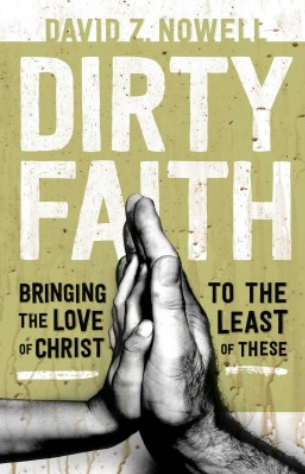14 Dec The Meaning of Dirty Faith
 When I first looked at the large title on the cover of David Z. Nowell’s book, the startling juxtaposition of these two words initially left me confused. How could faith be dirty? Why would someone want to practice a type of faith which is described so negatively? These are questions I asked myself in response to such an intriguing title. In my eyes, faith has always been a word associated with purity and different people uniting together in a shared, uplifting belief. While flipping through the pages of this book, I was exposed to stories that could in no way be described as clean.
When I first looked at the large title on the cover of David Z. Nowell’s book, the startling juxtaposition of these two words initially left me confused. How could faith be dirty? Why would someone want to practice a type of faith which is described so negatively? These are questions I asked myself in response to such an intriguing title. In my eyes, faith has always been a word associated with purity and different people uniting together in a shared, uplifting belief. While flipping through the pages of this book, I was exposed to stories that could in no way be described as clean.
The book opens with the story of Ileana, a social orphan whose mother forced her to be a sex slave before she even turned ten. The stories of repeated abuse and exploitation of Ileana, which will forever plague her childhood, and the lack of care she received from her horrific parents—the people who are supposed to love her the most— is difficult to even imagine. Unfortunately, stories like Ileana’s are by no means rare, which becomes evident when looking at the statistics: “Every year in Brazil, 250,000 adolescent and preadolescent girls enter the sex trade.” (Nowell) Two-hundred and fifty thousand may be just a number, but each girl contributing to it represents an innocent child, just like Ileana, who has had their childhood stripped away by the cruel forces of abuse and corruption.
Circumstances such as these are what inspired action from Hope Unlimited, an organization which recognizes the importance of actively engaging with the issue at hand, no matter how horrific it might be. Although practicing faith in the form of Bible studies, attending church, and donating money may show a love of God, it is also important to show that God loves everyone, including the poor, the starving, the abused, the homeless. It may be challenging to engage with the issues that oppressed members of society face, but through active involvement and willingness to go outside one’s comfort zone and, in effect, to get one’s hands dirty, it becomes much more feasible. This type of active involvement is precisely what Hope Unlimited does, in the form of a “dirty faith.” While it may be easier to passively promote change at a local church, by doing so, one is not able to truly face the roots of the issue—this is the part of Hope’s work that makes their faith “dirty.” Immersing oneself in the lives of those who society deems trash, unwanted, or useless is far from smooth or easy. It is, in Nowell’s words, “the embodiment of Christ in the midst of the darkest evil of our world.” This in itself is the practice of dirty faith.
Matthew Barber
guest contributor

